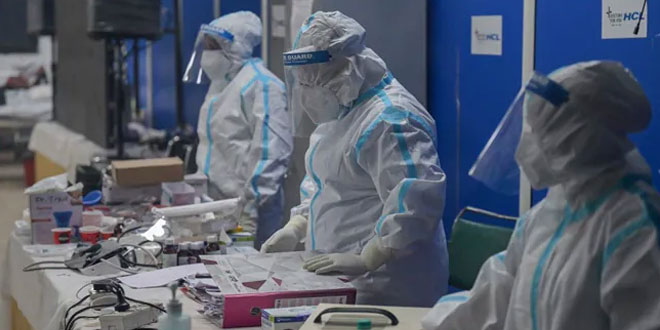New Delhi: With various variants still circulating across the world and nations reporting an increase in the COVID-19 cases, Dr Maria Van Kerkhove, Technical Lead COVID-19, WHO Health Emergencies Programme warned that the world is still in the middle of the pandemic. She stressed that the countries have done massive changes in their testing strategies, causing a decline in the number of tests being done around the world which is dangerous as the COVID-19 continues to be a threat.
Also Read: Covid Vaccines Of All Eligible Children At Earliest A Priority: PM To Chief Ministers
Emphasising on the importance of testing and tracking, Dr Kerkhove said that the uncertainty that there is about what the next variant will be remains a significant cause of concern because there is a need to plan for many different types of scenarios. She added,
I have confidence in the numbers, in terms of the reports of hospitalisation, the reports of deaths around the world but I have little confidence in the numbers of cases being reported around the world. The sheer fact that we have had massive changes in testing strategies, huge reductions in the numbers of tests being used around the world, we have very little confidence in what we are actually seeing in the trends, in terms of cases. As you know, Omicron is dominant worldwide. We are tracking sublineages of Omicron, sister lineages of Omicron, BA.4, BA.5, BA.2.12.1. This will continue.
The world faces massive challenges right now, yet #COVID19 has practical, reliable and available solutions. Far too many people risk severe illness, death, LongCovid, loss of futures and luckily due to #Omicron. Access, equity, rational use of these tools is possible. @WHO pic.twitter.com/LSbdc05J2D
— Maria Van Kerkhove (@mvankerkhove) April 26, 2022
Dr Kerkhove pointed out that people who are dying of Covid are dying because of the lack of the ability of the countries to track this virus, to better understand the trends, to monitor the variants of concern. She stressed that vaccination remains a key to fighting the disease. She said,
We have tools that can save lives but we need to use them strategically. and appropriately. Vaccines are saving lives but they are only saving lives in the people that they reach. Consistently, across high-income, low-income, and middle-income countries, those who are dying are individuals who do not have access or have refused vaccines, who have refused to be vaccinated, do not have access to diagnostics, do not have access to clinical care.
Dr Kerkhove further acknowledged that there is a fatigue setting in and people do not want to talk about it but the course of the pandemic needs to be changed by continuing being vigilant. She said,
This is our responsibility to ensure that there is vigilance for this particular virus because of the threat of variants, because of the threat for post-COVID-19 condition or long COVID, which we are just learning about, really starting to understand. Now, is not the time to retreat. Now, is the time to really strengthen what we have put in place and ensure that we keep people alive and we get our economies back on track and we save people’s livelihoods.
Also Read: 70 Per Cent People Who Took Booster Dose Didn’t Get Covid During 3rd Wave In India: Study
NDTV – Dettol have been working towards a clean and healthy India since 2014 via Banega Swachh India initiative, which is helmed by Campaign Ambassador Amitabh Bachchan. The campaign aims to highlight the inter-dependency of humans and the environment, and of humans on one another with the focus on One Health, One Planet, One Future – Leaving No One Behind. It stresses on the need to take care of, and consider, everyone’s health in India – especially vulnerable communities – the LGBTQ population, indigenous people, India’s different tribes, ethnic and linguistic minorities, people with disabilities, migrants, geographically remote populations, gender and sexual minorities. In wake of the current COVID-19 pandemic, the need for WASH (Water, Sanitation and Hygiene) is reaffirmed as handwashing is one of the ways to prevent Coronavirus infection and other diseases. The campaign will continue to raise awareness on the same along with focussing on the importance of nutrition and healthcare for women and children, fight malnutrition, mental wellbeing, self care, science and health, adolescent health & gender awareness. Along with the health of people, the campaign has realised the need to also take care of the health of the eco-system. Our environment is fragile due to human activity, that is not only over-exploiting available resources, but also generating immense pollution as a result of using and extracting those resources. The imbalance has also led to immense biodiversity loss that has caused one of the biggest threats to human survival – climate change. It has now been described as a “code red for humanity.” The campaign will continue to cover issues like air pollution, waste management, plastic ban, manual scavenging and sanitation workers and menstrual hygiene. Banega Swasth India will also be taking forward the dream of Swasth Bharat, the campaign feels that only a Swachh or clean India where toilets are used and open defecation free (ODF) status achieved as part of the Swachh Bharat Abhiyan launched by Prime Minister Narendra Modi in 2014, can eradicate diseases like diahorrea and the country can become a Swasth or healthy India.
[corona_data_new]



















